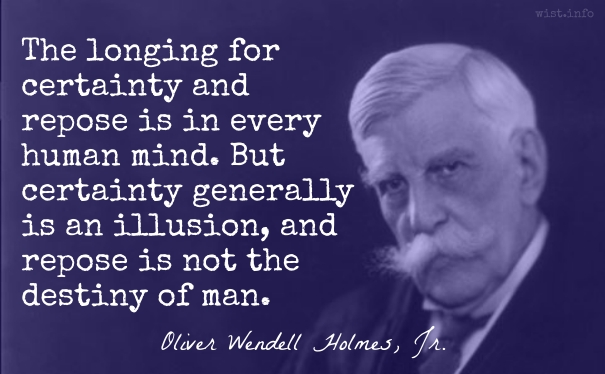One ship sails East,
And another West,
By the self-same winds that blow,
‘Tis the set of the sails
And not the gales,
That tells the way we go.Like the winds of the sea
Are the waves of time,
As we journey along through life,
‘Tis the set of the soul,
That determines the goal,
And not the calm or the strife.
Quotations about:
destiny
Note not all quotations have been tagged, so Search may find additional quotes on this topic.
Those people you saw — the realborn — are born without a plan. They’re born because biology tells humans to make more humans; but it doesn’t consider what to do with them after that. Realborn go for years without the slightest clue what they’re going to do with themselves. From what I understand, some of them never actually figure it out. They just walk through life in a daze and then fall into their graves at the end of it. Sad. And inefficient.
Don’t believe the world owes you a living. The world owes you nothing. It was here first.
Robert Jones Burdette (1844-1914) American humorist, lecturer, clergyman
“Advice to Young Men,” lecture (1833)
Quoted in the Duluth Evening Observer (1 Feb 1883). Frequently misattributed to Mark Twain. See here for more information.
How small man is on this little atom where he dies! But how great his intelligence! He knows when the face of the stars must be masked in darkness, when the comets will return after thousands of years, he who lasts only an instant! A microscopic insect lost in a fold of the heavenly robe, the orbs cannot hide from him a single one of their movements in the depth of space. What destinies will those stars, new to us, light? Is their revelation bound up with some new phase of humanity? You will know, race to be born; I know not, and I am departing.
Most people are like a falling leaf that drifts and turns in the air, flutters, and falls to the ground. But a few others are like stars which travel one defined path: no wind reaches them, they have within themselves their guide and path.
The ideal world of our revolutionaries […] is a flaming sense of the immediacy of the idea, a feeling that there is something in all men better than their present fate, and a conviction that what is, not only ought not, but need not be.
There must be either a predestined Necessity and inviolable plan, or a gracious Providence, or a chaos without design or director. If then there be an inevitable Necessity, why kick against the pricks? If a Providence that is ready to be gracious, render thyself worthy of divine succour. But if a chaos without guide, congratulate thyself that amid such a surging sea thou hast a guiding Reason.
[Ἤτοι ἀνάγκη εἱμαρμένης καὶ ἀπαράβατος τάξις ἢ πρόνοια ἱλάσιμος ἢ φυρμὸς εἰκαιότητος ἀπροστάτητος. εἰ μὲν οὖν ἀπαράβατος ἀνάγκη, τί ἀντιτείνεις; εἰ δὲ πρόνοια ἐπιδεχομένη τὸ ἱλάσκεσθαι, ἄξιον σαυτὸν ποίησον τῆς ἐκ τοῦ θείου βοηθείας. εἰ δὲ φυρμὸς ἀνηγεμόνευτος, ἀσμένιζε ὅτι ἐν τοιούτῳ κλύδωνι αὐτὸς ἔχεις ἐν σαυτῷ τινα νοῦν ἡγεμονικόν.]
Marcus Aurelius (AD 121-180) Roman emperor (161-180), Stoic philosopher
Meditations, Book 12, #14 [tr. Haines (1916)]
(Source)
Original Greek. Alternate translations:
Either fate, (and that either an absolute necessity, and unavoidable decree; or a placable and flexible Providence) or all is a mere casual confusion, void of all order and government. If an absolute and unavoidable necessity, why doest thou resist? If a placable and exorable Providence, make thyself worthy of the divine help and assistance. If all be a mere confusion without any moderator, or governor, then hast thou reason to congratulate thyself; that in such a general flood of confusion thou thyself hast obtained a reasonable faculty, whereby thou mayest govern thine own life and actions.
[tr. Casaubon (1634), #11]
Either the Order of Things are fixed by irrevocable Fate, or Providence may be worked into Compassion, or else the World Floats at Raondom without any Steerage. Now if nature lies under immovable Necessity, to what purpose should you struggle against it? If the favor of Providence is to be gained, qualify your self for the Divine Assistance: But if Chance, and Confusion carry it, and no body sits at the Helm; be you contented and Ride out the Storm patiently, for you have a Governor within you , though the World has none.
[tr. Collier (1701)]
Either there is a fatal necessity and invincible order, or a kind providence, or a confusion without a purpose and without a director. If then there is an invincible necessity, why dost thou resist? But if there is a providence which allows itself to be propitiated, make thyself worthy of the help of the divinity. But if there is a confusion without a governor, be content that in such a tempest thou hast in thyself a certain ruling intelligence.
[tr. Long (1862)]
Either the order of things is fixed by irrevocable fate, or providence may be worked into compassion, or else the world floats at random without any steerage. Now if nature lies under an immovable necessity, to what purpose should you struggle against it? If the favor of providence is to be gained, qualify yourself for divine assistance; but if chance and confusion prevail, be you contented that in such a storm you have a governing intelligence within you.
[tr. Zimmern (1887)]
Either the Necessity of destiny and an order none may transgress, or Providence that hears intercession, or an ungoverned welter without a purpose. If then a Necessity which none may transgress, why do you resist? If a Providence admitting intercession, make yourself worthy of assistance from the Godhead. If an undirected welter, be glad that in so great a flood of waves you have yourself within you a directing mind.
[tr. Farquharson (1944)]
Fatal necessity, and inescapable order. Or benevolent Providence. Or confusion -- random and undirected. If it's an inescapable necessity, why resist it? If it's Providence, admits of being worshipped, then try to be worthy of God's aid. If it's confusion and anarchy, then be grateful that on this raging sea you have a mind to guide you.
[tr. Hays (2003)]
Either predetermined necessity and unalterable cosmic order, or a gracious providence, or a chaotic ungoverned mixture. If a predetermined necessity, why do you resist? If it is a gracious Providence that can hear our prayers, then make yourself worthy of divine assistance. If a chaotic ungoverned mixture, be satisfied that in the midst of this storm, you have within yourself a mind whose nature it is to govern and command.
[tr. Needleman/Piazza (2008)]
Men make their own history, but they do not make it just as they please; they do not make it under circumstances chosen by themselves but under circumstances directly encountered, given and transmitted from the past. The tradition of all the dead generations weighs like a nightmare on the brains of the living.
Karl Marx (1818-1883) German philosopher, economist, sociologist, historian, journalist
The Eighteenth Brumaire of Louis Napoleon, ch. 1 (1852)
(Source)
There is a powerful craving in most of us to see ourselves as instruments in the hands of others and thus free ourselves from the responsibility for acts which are prompted by our own questionable inclinations and impulses. Both the strong and the weak grasp at this alibi. The latter hide their malevolence under the virtue of obedience: they acted dishonorably because they had to obey orders. The strong, too, claim absolution by proclaiming themselves the chosen instrument of a higher power — God, history, fate, nation or humanity.
Eric Hoffer (1902-1983) American writer, philosopher, longshoreman
The Passionate State of Mind, Aphorism 85 (1955)
(Source)
A pound of pluck is worth a ton of luck.
James A. Garfield (1831-1881) US President (1881), lawyer, lay preacher, educator
“Elements of Success,” speech, Spencerian Business College, Washington, D.C. (29 Jul 1869)
(Source)
All rising to a great place is by a winding stair.
Francis Bacon (1561-1626) English philosopher, scientist, author, statesman
“Of Great Place,” Essays, No. 11 (1625)
(Source)
The old order changeth, yielding place to new,
And God fulfills Himself in many ways,
Lest one good custom should corrupt the world.Alfred, Lord Tennyson (1809-1892) English poet
Idylls of the King, “The Passing of Arthur” (1859-1885)
(Source)
For man proposes but God disposes. The path a person takes does not lie within himself.
[Nam homo proponit, sed Deus disponit, nec est in homine via ejus.]
Thomas à Kempis (c. 1380-1471) German-Dutch priest, author
The Imitation of Christ [De Imitatione Christi], Book 1, ch. 19, v. 2 (1.19.2) (c. 1418-27) [tr. Creasy (1989)]
(Source)
Thomas saying that, regardless of a person's good intentions to act virtuously, they are dependent on God's grace to make that actually happen.
The phrase "Man proposes but God disposes" (or the Latin original of it) was coined by Thomas, which makes it ironic where some later translators put it in quotations or self-referent indeeds.
The text given relates to, is frequently footnoted to, and even is quoted directly from:
- Proverbs 16:9 ("A man's heart deviseth his way: but the Lord directeth his steps." [KJV])
- Jeremiah 10:23 ("O Lord, I know that the way of man is not in himself: it is not in man that walketh to direct his steps." [KJV])
(Source (Latin)). Alternate translations:
For man purposeth, but God disposeth: nay, the way that man shall walk in this world is not in himself but in the grace of God.
[tr. Whitford/Raynal (1530/1871)]
Man proposes, but God disposes. The way that a man shall walk in this world is found not in himself, but in the grace of God.
[tr. Whitford/Gardiner (1530/1955)]
For man doth propose but God doth dispose, neither is the way of man in his owne hands.
[tr. Page (1639), 1.19.9]
A Man's Heart deviseth his Way, but the Lord directeth his Steps, says Solomon: We may contrive and act as seems most adviseable; by which we do so, are from the Lord, so is the Event of our having done it entirely in his disposal.
[tr. Stanhope (1696; 1706 ed.), 1.19.3]
Tho' the heart of man deviseth his way, yet the Lord ordereth the event; and that it is not in man that walketh, to direct his steps.
[tr. Payne (1803)]
For man proposes, but God disposes; neither is the way of man in himself.
[Parker ed. (1841); Bagster ed. (1860); Anon. (1901)]
For man proposes but GOD disposes: nor is it in man to direct his steps.
[tr. Dibdin (1851)]
For man proposeth, but God disposeth; and the way of a man is not in himself.
[tr. Benham (1874)]
For man, indeed, proposes but God disposes, and God's way is not man's.
[tr. Croft/Bolton (1940)]
For man proposes, but God disposes, and a man's road is not within himself.
[tr. Daplyn (1952)]
Man proposes, but God disposes, and man's destiny is not in his own hands.
[tr. Sherley-Price (1952)]
They know that "man proposes, and God disposes"; the course of a man's life is not what he makes it.
[tr. Knox-Oakley (1959)]
For man proposes, God disposes, and it is not for man to choose his lot.
[tr. Knott (1962)]
Man indeed proposes, bit it is God who disposes nor is the course of man in his power as he goes his way.
[tr. Rooney (1979)]
Destiny leads the willing, but drags the unwilling.
Thomas Fuller (1654-1734) English physician, preacher, aphorist, writer
Gnomologia: Adages and Proverbs, #1275 (1732)
(Source)
See Seneca the Younger.
Practically, I am, nevertheless, compelled to act as if freedom of the will existed. If I wish to live in a civilized community, I must act as if man is a responsible being. I know that philosophically a murderer is not responsible for his crime; nevertheless, I must protect myself from unpleasant contacts. I may consider him guiltless, but I prefer not to take tea with him.
Albert Einstein (1879-1955) German-American physicist
“What Life Means to Einstein,” Interview with G. Viereck, Saturday Evening Post (26 Oct 1929)
(Source)
Edited as "I am compelled to act as if free will existed, because if I wish to live in a civilized society I must act responsibly. I know that philosophically a murderer is not responsible for his crime, but I prefer not to take tea with him," in Viereck, Glimpses of the Great (1930).
But dreadful is the mysterious power of fate — there is no deliverance from it by wealth or by war, by towered city, or dark, sea-beaten ships.
[ἀλλ᾽ ἁ μοιριδία τις δύνασις δεινά:
οὔτ᾽ ἄν νιν ὄλβος οὔτ᾽ Ἄρης, οὐ πύργος, οὐχ ἁλίκτυποι
κελαιναὶ νᾶες ἐκφύγοιεν.]Sophocles (496-406 BC) Greek tragic playwright
Antigone, l. 951, Strophe 1 (Stasimon 4) [Chorus] (441 BC) [tr. Jebb (1891)]
(Source)
Original Greek. Alt. trans.:
Strange are the ways of Fate, her power
Nor wealth, nor arms withstand, nor tower;
Nor brass-prowed ships, that breast the sea
From Fate can flee.
[tr. Storr (1859)]
No power in wealth or war
Or tough sea-blackened ships
Can prevail against untiring Destiny!
[tr. Fitts/Fitzgerald (1939), ll. 744-46]
There is no tower.
So high, no armory so great,
No ship so swift, as is the power
Of man's inexorable fate.
[tr. Watling (1947)]
Mysterious, overmastering, is the power of Fate,
From this, nor wealth nor force of arms
Nor strong encircling city-walls
Nor storm-tossed ship can give deliverance.
[tr. Kitto (1962)]
Fate has a terrible power
That nothing escapes, not wealth,
Not warfare, not a fortress tower,
Not even black ships beating against the sea.
[tr. Woodruff (2001)]
Fate's power, though, is mighty, and neither Lords of lands nor Ares nor castles nor flighty ships well-beaten by the waves can escape her.
[tr. Theodoridis (2004)]
But the power of fate is full of mystery.
There’s no evading it, no, not with wealth,
or war, or walls, or black sea-beaten ships.
[tr. Johnston (2005)]
But the power of fate (whatever it may be) is terrible and wonderful.
Neither wealth nor Ares,
no tower, no dark ships
beaten by the sea can escape it.
[tr. Tyrell/Bennett]
HAMLET: There’s a divinity that shapes our ends,
Rough-hew them how we will —William Shakespeare (1564-1616) English dramatist and poet
Hamlet, Act 5, sc. 2, l. 11ff (5.2.11-12) (c. 1600)
(Source)
EDMUND: This is the excellent foppery of the world, that, when we are sick in fortune, — often the surfeit of our own behavior, — we make guilty of our disasters the sun, the moon, and the stars: as if we were villains by necessity; fools by heavenly compulsion; knaves, thieves, and treachers, by spherical predominance; drunkards, liars, and adulterers, by an enforced obedience of planetary influence; and all that we are evil in, by a divine thrusting on: an admirable evasion of whoremaster man, to lay his goatish disposition to the charge of a star!
William Shakespeare (1564-1616) English dramatist and poet
King Lear, Act 1, sc. 2, l. 125ff (1.2.125) (1606)
(Source)
Here’s a test to find whether your mission on earth is finished: If you’re alive, it isn’t.
Richard Bach (b. 1936) American writer
Illusions: The Adventures of a Reluctant Messiah, ch. 15, epigraph (1977)
(Source)
But helpless Pieces of the Game He plays
Upon this Checker-board of Nights and Days;
Hither and thither moves, and checks, and slays,
And one by one back in the Closet lays.
… [L]onging for certainty and for repose [is] in every human mind. But certainty generally is an illusion, and repose is not the destiny of man.
Oliver Wendell Holmes, Jr. (1841-1935) American jurist, Supreme Court Justice
“The Path of the Law,” Harvard Law Review (Feb 1897)
(Source)
Citation 10 Harvard Law Review 457 (1897).
DESTINY, n. A tyrant’s authority for crime, and a fool’s excuse for failure.
Ambrose Bierce (1842-1914?) American writer and journalist
“Destiny,” The Cynic’s Word Book (1906)
(Source)
FIRST LORD: The web of our life is a mingled yarn,
good and ill together.William Shakespeare (1564-1616) English dramatist and poet
All’s Well That Ends Well, Act 4, sc. 3, l. 73ff (4.3.73-74) (1602?)
(Source)
PISANIO: Fortune brings in some boats that are not steered.
William Shakespeare (1564-1616) English dramatist and poet
Cymbeline, Act 4, sc. 3, l. 54 (4.3.54) (1611)
(Source)
PORTIUS: ‘Tis not in mortals to command success,
But we’ll do more, Sempronius; we’ll deserve it.Joseph Addison (1672-1719) English essayist, poet, statesman
Cato, Act 1, sc. 2, l. 43ff (1713)
(Source)
This passage was widely known to America's Founders; John Adams paraphrases it in a letter to his wife Abigail (1776-02-18), and George Washington in letters to Nicholas Cooke (1775-10-29) and, most famously, Benedict Arnold (1775-12-05).
And this made me remember that common saying everyone in China was raised with: “If you can’t change your fate, change your attitude.”
Amy Tan (b. 1952) American novelist
The Kitchen God’s Wife, ch. 17 (1991)
(Source)
Usually quoted without the attribution to a common saying.
CASSIUS: Why, man, he doth bestride the narrow world
Like a Colossus, and we petty men
Walk under his huge legs and peep about
To find ourselves dishonourable graves.
Men at some time are masters of their fates:
The fault, dear Brutus, is not in our stars,
But in ourselves, that we are underlings.William Shakespeare (1564-1616) English dramatist and poet
Julius Caesar, Act 1, sc. 2, l. 142ff (1.2.142-148) (1599)
(Source)


































